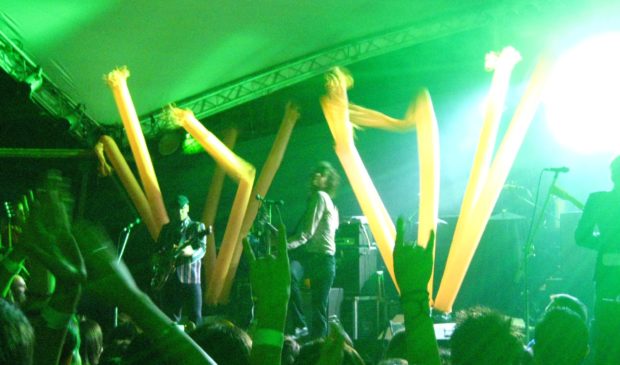Early numbers in, Red River venues optimistic about impact of new rules
Wednesday, June 28, 2017 by
Chad Swiatecki The numbers are starting to roll in on the city’s experiment to allow later outdoor music in the Red River Cultural District.
Early financial reports and anecdotes from club owners in the stretch of 13 bars and live music venues paint the city’s pilot program as beneficial to the businesses and Austin musicians.
A look at the state’s monthly mixed beverage sales tax tally shows three of five outdoor venues in the district reported increased revenue during the month of May, with others saying updated reporting and other metrics will show the benefits of the later hours.
According to the data, Cheer Up Charlies, Barracuda and the Mohawk reported revenue increases, with Mohawk business jumping by 65 percent compared to May 2016. Empire Control Room and Stubb’s BBQ showed revenue decreases on the reports, though it’s worth noting that clubs occasionally revise and update prior months’ sales records to the state, and representatives from both venues told the Austin Monitor the extended noise curfews on weekends caused an increase in their business.

Comparing the numbers from May 2016 to the preliminary sales reports for May 2017, Barracuda sales increased from $60,372 to $64,889; Cheer Up Charlies increased from $109,429 to $114,633; Empire Control Room had a decrease from $93,524 to $38,129; the Mohawk saw an increase from $92,215 to $152,401; and Stubb’s saw a decrease from $337,996 to $245,122, though these numbers may change.
The city started the six-month program at the request of venue operators who said they could increase their monthly revenue by 10 to 20 percent if given an extra hour on Thursday, Friday and Saturday nights to present live music outdoors. The thinking behind the extension is that the majority of liquor sales – in most cases a music venue’s main revenue – come after 11 p.m. on weekends and outdoor shows that end early send patrons and their dollars elsewhere.
Merchants in the district have committed to regularly assembling data on sales, number of Austin acts featured with the extended hours and how much of a financial impact those shows can make. That information, along with ongoing sound-monitoring data and any cases of confirmed noise violations, will be used by city staff at the end of the year in evaluating whether the extended noise curfews will stay in place.
Ryan Garrett, general manager at Stubb’s, said the later hours let the small amphitheater book a community conjunto festival in May that featured all Austin acts. He said the later shows let him feature more Austin acts – 45 in 2017 compared to 17 in 2016 – and pointed to the district-wide Hot Summer Nights festival next month as another way Austin musicians will benefit from the pilot program.
In addition to booking shows this summer and fall to better utilize the pilot program’s hours, Garrett said he and other merchants in the district have worked at communicating with neighborhood groups such as the North University Neighborhood Association to alleviate concerns over noise issues.
“The good news is they’re not hearing the noise up there, and the outreach we’ve done has fortified a relationship and put lots of eyes on a perceived issue,” he said. “We’re doing things like sharing information on set times and looking at the decibel readings to see where noise is coming from.”
Stephen Sternschein, co-owner of Empire Control Room, said his updated data will show a 15 percent increase over the previous year thanks to crowds sticking around later.
“Probably 70 percent of the (liquor) business comes after 11 p.m., and we know that the per-person average almost doubles from $7 to $13 when you look at before and after 11,” he said. “Everyone is super excited about the later hours because an extra hour makes a big difference, and there are plenty of bands that don’t like taking the stage at 10 p.m. when there aren’t going to be as many people there.”
Photo by bloomsberries made available through a Creative Commons license.
The Austin Monitor’s work is made possible by donations from the community. Though our reporting covers donors from time to time, we are careful to keep business and editorial efforts separate while maintaining transparency. A complete list of donors is available here, and our code of ethics is explained here.
You're a community leader
And we’re honored you look to us for serious, in-depth news. You know a strong community needs local and dedicated watchdog reporting. We’re here for you and that won’t change. Now will you take the powerful next step and support our nonprofit news organization?




